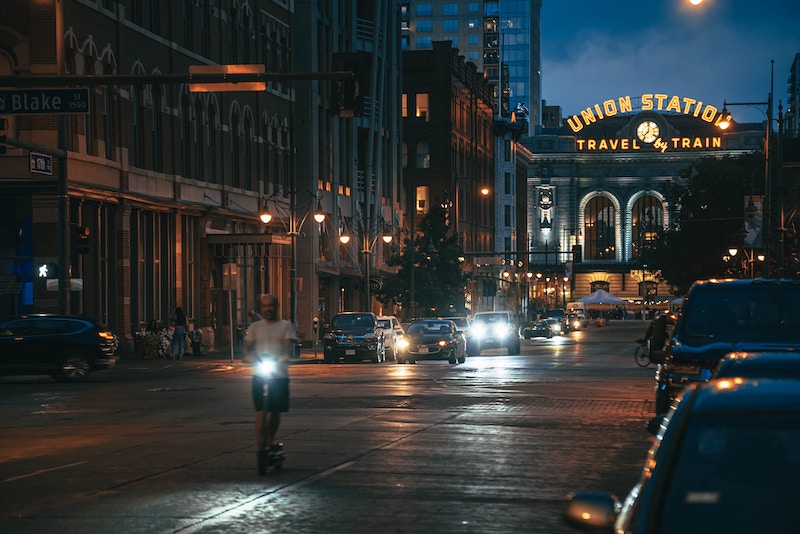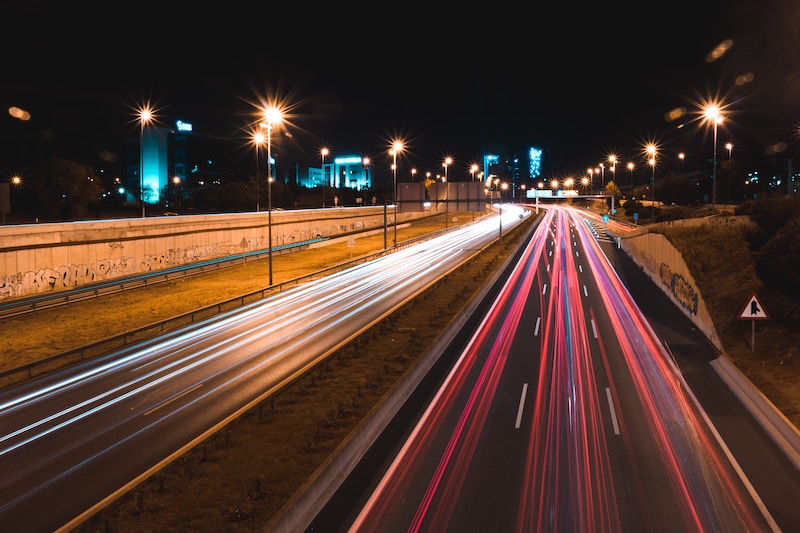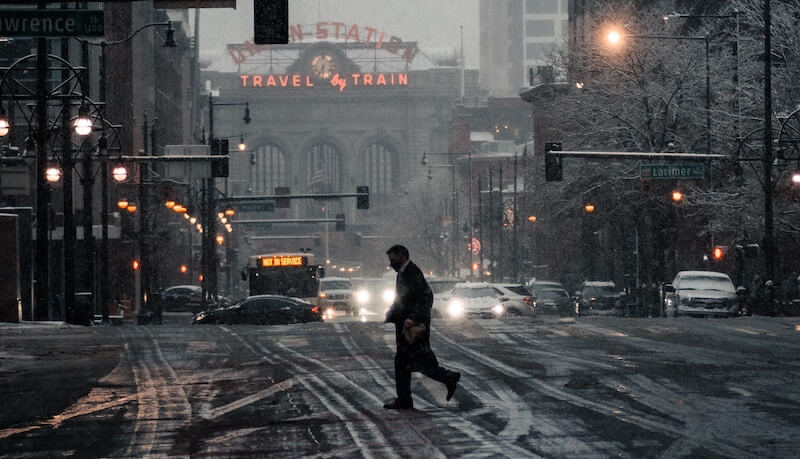victims for over 25 years.
Addressing the Rise in Pedestrian Deaths at Night: A Denver Perspective
In a revealing piece, the New York Times recently highlighted a worrying trend across America: the increasing number of pedestrian fatalities occurring at night. It’s fascinating and I highly recommend you check it out.
(Tangent: The interactive stories put out by the Times and their data geeks are fascinating to me!)
Anyway, I was reading this interesting piece of journalism and had many thoughts about similar hazards on Colorado’s roads. So, of course, I decided to write about it.
Like the rest of the country, Colorado and Denver have experienced a disturbing uptick in road fatalities. Yet we struggle to make changes that turn the trend around. The New York Times article got me thinking about all of the compounding problems that have made our roads less safe over the last few decades. Here are a few…
Distracting Technologies: Smartphones and Smart Cars

Photo credit: Alexandre Boucher / Unsplash
In today’s world, technology is a double-edged sword. While smartphones and smart cars offer convenience and connectivity, they also pose significant distractions to drivers. The allure of a notification or the complexity of modern car dashboards can easily divert attention from the road. In Colorado, where bustling city life often meets unpredictable weather, the consequences of such distractions can be deadly, especially for pedestrians.
The Smartphone Menace
Smartphones have become inseparable companions for many, but their use while driving can have fatal repercussions. Texting, social media browsing, or even GPS navigation can significantly impair a driver’s attention, reaction time, and overall awareness of their surroundings.
I have been personally involved in passing legislation in Colorado to limit distracted driving on Colorado’s roads. I have seen far too many people injured or killed by distracted drivers. In 2024, I plan to double-down on these efforts and, hopefully, pass even stricter laws against texting while driving.
Smart Cars: Helpful or Hindrance?
Modern vehicles come equipped with advanced “infotainment” systems. These systems, meant to enhance the driving experience, often require significant attention to operate. Adjusting settings or navigating these systems while driving, especially on Denver’s busy streets, increases the risk of not noticing a pedestrian crossing the road.
Then there’s the whole debate around autopilot functions. Tesla recently recalled 2 million cars that were equipped with Autosteer, which Tesla describes as “traffic-aware cruise control.” Apparently, drivers were using the function in ways that weren’t safe. (Who saw that coming?) Also, San Francisco has allowed self-driving taxi services on its streets and it’s been… rough.
Manual vs Automatic Transmission

Photo ctredit: Alok Sharma / Unsplash
The automotive industry has seen a drastic decline in the sale of manual transmission vehicles. This shift to automatic cars has its implications. Drivers of automatic vehicles often find themselves with more freedom to engage in other activities, such as eating, using a phone, or fiddling with the car’s entertainment system.
With less need to focus on gear shifting, drivers may become less engaged with the driving process. This lack of engagement can be particularly hazardous in pedestrian-heavy areas of Denver, where constant vigilance is required to ensure pedestrian safety.
Darkness Itself

Photo credit: Josh Hild / Unsplash
The cover of night adds another layer of danger to pedestrians. Poor visibility is a significant factor in nighttime accidents.
The Perils of Poor Lighting
Many areas in Colorado, including parts of Denver, suffer from inadequate street lighting. This makes it difficult for drivers to spot pedestrians, particularly those wearing non-reflective clothing.
Road Hazards in the Dark
Apart from visibility issues, drivers might not easily notice road hazards or changes in traffic patterns at night, increasing the likelihood of accidents involving pedestrians.
American Roads are Designed for Speed

Photo credit: Javier Estebar / Unsplash
The design of American roads, with a focus on vehicle efficiency and speed, often neglects pedestrian safety. This design philosophy is evident in Colorado’s road infrastructure, where wide lanes and limited pedestrian crossings encourage higher speeds and reduce driver attentiveness to pedestrian movement.
Cars Over Pedestrians

Photo credit: Colin Lloyd / Unsplash
This design approach has historically prioritized vehicles over pedestrians, leading to roads that are inherently more dangerous for those on foot, especially in urban areas like Denver where pedestrian traffic is high.
The rise in pedestrian deaths in Colorado, as in the rest of America, is a multifaceted issue. Addressing it requires a comprehensive approach, involving changes in road design, better lighting, public awareness campaigns on the dangers of distracted driving, and stricter enforcement of traffic laws.
As our cities grow and evolve, it’s imperative that we prioritize the safety of all road users, especially the most vulnerable – pedestrians.
Free Consultation
Search For
Recent Articles
- Bicycle Accident Reported at 15th St and Wewatta St in Denver
- Motorcycle and Pickup Truck Collision on W 6th Ave Leaves No Serious Injuries
- Motorcycle and Bus Collision Reported at Blake and Downing Intersection
- Possible DUI Incident on E 9th Ave in Denver Leaves No Serious Injuries
- Motorcycle and SUV Collide at Denver Intersection in Mar Lee Neighborhood
Categories
- Arvada
- Aurora
- Auto Accident eBook
- Auto Insurance
- Bicycle
- Bicycle/Motorcycle Accidents
- Bodily injury
- Car accidents
- Centennial
- Colorado
- Colorado Legislature
- community
- Denver
- Denver Metro Motor Vehicle Accidents
- distracted driving
- DUI Accidents
- Englewood
- Events
- Flood Insurance
- Fort Collins
- Highlands Ranch
- Hit and Run
- In The News
- insurance companies
- Lakewood
- Littleton
- Marijuana DUI
- Motorcycle Accidents
- Motorcycle Insurance
- Motorcycle Law eBook
- Motorcycles
- Newsletter
- Pedestrian
- Personal Injury Law
- Press Release
- Safe Driving
- Safety
- Scooters
- technology
- Tips
- Uncategorized
- vibrio vulnificus bacteria
- Videos
- Westminster
- Winter Driving
- Wrongful Death
Archive
- July 2025
- June 2025
- May 2025
- April 2025
- March 2025
- February 2025
- January 2025
- December 2024
- November 2024
- October 2024
- September 2024
- August 2024
- July 2024
- May 2024
- April 2024
- March 2024
- February 2024
- January 2024
- December 2023
- November 2023
- October 2023
- September 2023
- August 2023
- July 2023
- June 2023
- May 2023
- April 2023
- March 2023
- February 2023
- January 2023
- November 2022
- September 2022
- April 2022
- March 2022
- February 2022
- January 2022
- December 2021
- November 2021
- October 2021
- September 2021
- August 2021
- July 2021
- June 2021
- May 2021
- April 2021
- January 2021
- December 2020
- November 2020
- October 2020
- September 2020
- August 2020
- July 2020
- June 2020
- May 2020
- April 2020
- March 2020
- February 2020
- January 2020
- December 2019
- November 2019
- October 2019
- September 2019
- August 2019
- July 2019
- June 2019
- May 2019
- March 2019
- February 2019
- January 2019
- December 2018
- November 2018
- October 2018
- September 2018
- August 2018
- July 2018
- June 2018
- May 2018
- April 2018
- March 2018
- February 2018
- January 2018
- December 2017
- November 2017
- October 2017
- September 2017
- August 2017
- July 2017
- June 2017
- May 2017
- April 2017
- March 2017
- February 2017
- January 2017
- December 2016
- November 2016
- October 2016
- September 2016
- August 2016
- July 2016
- June 2016
- May 2016
- April 2016
- March 2016
- February 2016
- January 2016
- December 2015
- November 2015
- October 2015
- September 2015
- August 2015
- July 2015
- June 2015
- May 2015
- April 2015
- February 2015
- November 2014
- October 2014
- September 2014
- July 2014
- June 2014
- May 2014
- April 2014
- March 2014
- February 2014
- January 2014
- October 2012
- September 2012
- August 2012
- July 2012
- February 2012
- March 2011
- October 2010